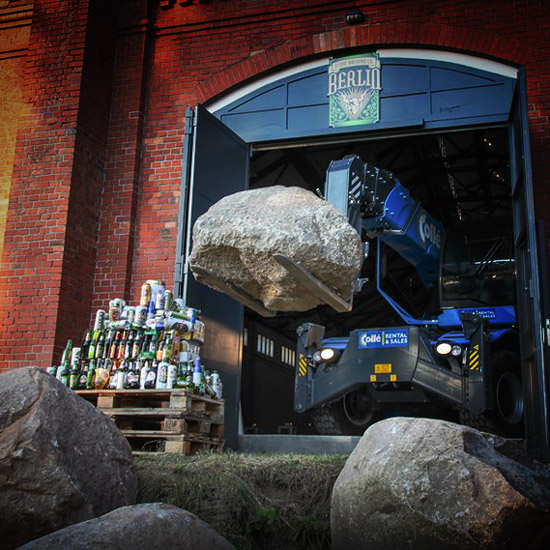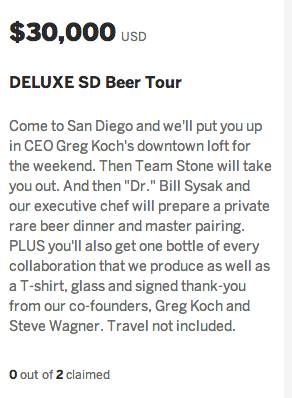
Whether he’s shouting into a megaphone, crowd-surfing at a bar, unveiling plans to build a new brewery or comparing the craft beer category to a third-world bus, Koch’s made a habit of capturing the media spotlight.
So last month, when Stone unveiled plans to construct its new $25 million brewery in Berlin, it wasn’t all that surprising that Koch would kick off the ceremonial announcement by getting behind the controls of a forklift and dropping a giant boulder on a pile of “industrial” beers from around the world.
But that wasn’t the stunt that earned Stone the attention. Instead, it was the company’s simultaneous launch of a crowdfunding campaign that had craft beer drinkers and fellow industry professionals buzzing.
In exchange for about $40, those who helped finance the company’s new brewery development in Deutschland could get their hands on a special collaboration brew or a limited edition t-shirt, among other perks offered to those who funded the campaign.
The goal? Raise $1 million in fewer than 30 days. Stone needed just 19 days to reach $1 million and, on Aug. 13, decided to extend its campaign by 15 days. It was originally scheduled to conclude on Aug. 16.
The timeline adjustment was an important modification for Stone, which is now able to deliver additional collaboration brews to its fans, but it wasn’t the first time the company made a change to the campaign.
The first alteration happened within days of launching the endeavor. Stone originally said it planned to use the money it raised to “expedite the construction of the restaurant and garden components” of its new brewery venture in Berlin and its yet-to-be-announced East Coast facility. When the crowd-participation campaign (as Stone called it) went public, many individuals (including myself) criticized the brewery for using an online crowdfunding platform to help fund construction of the two new locations. The chief complaint was that Stone, the country’s tenth largest craft brewery, shouldn’t be asking customers to help finance expansion.
“For Stone to do a public crowdfund is just unnecessary and I think a lot of people feel that way,” Scot Blair, the owner of Hamilton’s Tavern, a well-known craft beer bar in San Diego, told Brewbound.“They could have done this a million different ways that had less ‘shock and awe.’”
While the $1 million crowdfunding ask certainly helped the company grab a few headlines, Stone has vehemently maintained throughout the entirety of the campaign that no “shock value” is intended.
“We’d have rather not had to include any monetary goal, but since Indiegogo requires that, we went with this nice, round number, feeling it would be disingenuous to pick a lower figure,” the company told Brewbound in a statement.
Still, on the surface, it appeared as though Stone — a company that generated more than $135 million in revenue in 2013 — was asking its customers for a handout.
“Cool as it is to see them expanding overseas, the coming to fans hat-in-hand thing is kinda tacky,” wrote one BeerAdvocate user on the online forum. “If I’m going to ‘invest’ in Stone, as Koch says, I don’t want a shirt — I want shares.”
After enough drinkers voiced their opinions on sites like BeerAdvocate, which boasts more than 400,000 users, Stone tweaked the narrative. In a video posted to YouTube on July 23, Koch said the company isn’t using the crowdfunding campaign to fuel the company’s expansion projects. Instead, he described the donated funds as “icing on the cake,” and explained that the campaign was originally intended as a presales event.
The following day, Koch also explained the changes on a BeerAdvocate thread.
“I heard the feedback and we reconsidered, well, pretty much everything,” Koch wrote. “Gotta own up when I muck something up, and it sure appears that I did! I thought this whole thing would be a fun way to engage folks in a new chapter of our adventure, but I see that it seemed like it was panhandling for money.”

“We just did things the way we actually wanted to from the start — putting beers up for pre-order and collecting orders for beers to be brewed and released at a future date to the specifics of fan demand,” the company told Brewbound.
The well-timed pivot proved to be an excellent case study for why companies, especially established ones like Stone, must closely monitor consumer feedback if they’re going to crowdfund.
“I think big companies want to make sure that they are using crowdfunding successfully,” said Brian Meece, the founder of the online crowdfunding platform RocketHub. “But whether you are a small, emerging company or an established one, you have to listen to your customers.”
For Stone, paying attention to what consumers were saying online and changing course during the formative stages of the campaign may have increased the company’s chances for success.
Prior to making the adjustment, Stone had received only $120,000 of its $1 million goal. In the days following Koch’s video blog and comment on BeerAdvocate, however, donations spiked. On July 25, Stone’s campaign was 22 percent funded and five days later it was nearly halfway to its $1 million target.
Focusing the campaign on specialty collaboration brews instead of traditional crowdfunding perks paid dividends and Stone was selling out of beers it hadn’t even written recipes for in a matter of days.
But successful crowdfunding campaigns, even beer presale events, require more than just thoughtful feedback. For Meece, an effective campaign is all about adding value to an audience and allowing that group to participate in a story, even if they aren’t funding it directly.
“Crowdfunding is an online event that harnesses networking for funding, awareness and feedback,” he said.
Stone has, no doubt, harnessed the power of its network. It tapped into a vast group of passionate craft beer fans on social media — including more than 400,000 of its own combined Twitter followers and Facebook fans. For each new release (perk), Stone has created an informational video that explains the story behind each brew, creating the opportunity to interact with its fans on a daily basis.
The company has also carefully selected its collaboration partners and is working with a slew of respected craft companies like Dogfish Head, Victory Brewing, and BrewDog, all of which boast thousands of their own passionate supporters. In essence, it has broadened the reach of Stone’s marketing efforts.
The result? As of press time (and with 11 days left in the campaign), Stone has banked more than $1.9 million from more than 11,400 backers. And, since Stone plans to produce the 14 new beers through 2017, it has built in plenty of opportunities to continuing engaging with a passionate group of supporters all over the world.

In other words, Stone has seriously activated its consumer base.
“Crowdfunding, when it’s done right, galvanizes the folks who were on the fence and builds raving-fan customers,” said Meece.
It also builds awareness and can help catapult a company like Stone into the mainstream.
“No company is big enough to not need some awareness,” said Meece. “It doesn’t matter if you’re Apple or McDonalds, those companies are always fighting for mind space. Conversation is king. Having people talk about you is what it’s all about.”
Stone’s campaign not only got people talking, it got people spending. Stone’s campaign is the most successful brewery crowd-raise of all time, surpassing Miami’s J. Wakefield Brewing, which raised more than $111,000 on the platform ‘CrowdBrewed’ last October. Prior to that campaign, it was fellow San Diego craft brewer Modern Times that held the title of most successful ever. Modern Times founder Jacob McKean, a former Stone Brewing employee himself, raised more than $65,000 via Kickstarter in May 2013.
So can drinkers expect to see more crowdfunding efforts from established craft breweries? Meece thinks so.
“It wouldn’t surprise me to see other market leaders in the craft industry leverage crowdfunding to launch new products or venues,” he said.
If that’s the case, mark Stone Brewing down as an important first mover and prepare for some more headlines.
